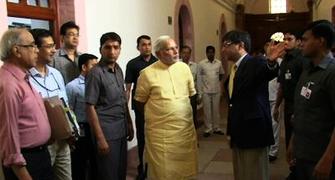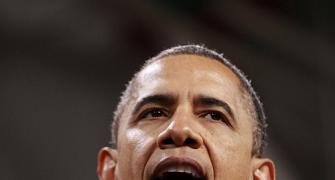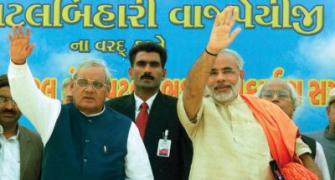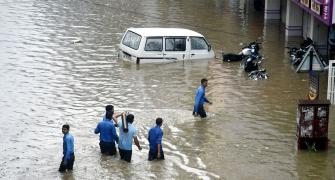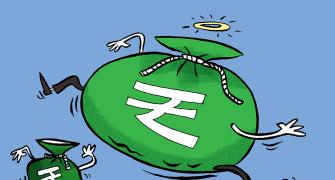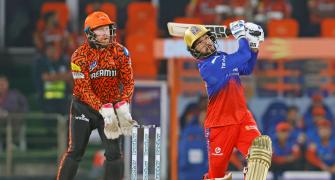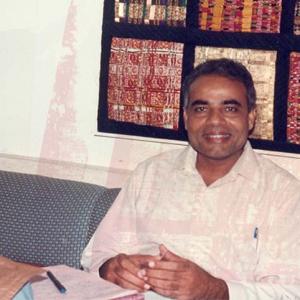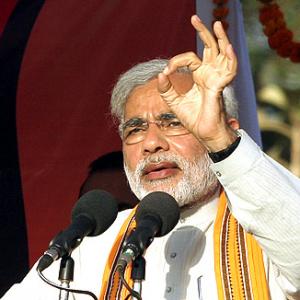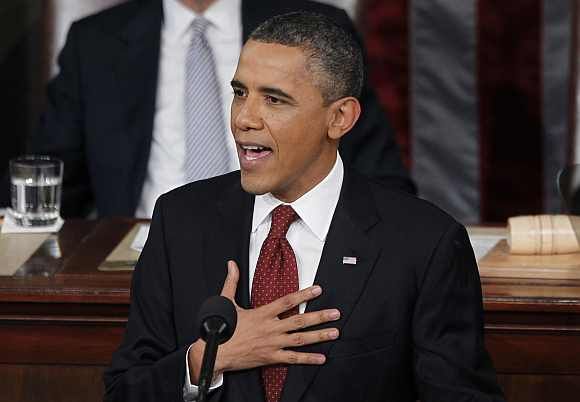 The President was apparently unaware of the Narendra Modi visa ban controversy till April. Aziz Haniffa/Rediff.com has the scoop.
The President was apparently unaware of the Narendra Modi visa ban controversy till April. Aziz Haniffa/Rediff.com has the scoop.
President Barack Obama was apparently totally unaware of the raging controversy over the visa ban on Narendra Modi till April this year.
Several United States lawmakers, on the urging of their Indian-American constituents, over the past few years were writing to then secretary of state Hillary Clinton and her successor John F Kerry, calling on the US State Department to lift the visa ban on the then Gujarat chief minister, while other groups like the Coalition against Genocide convinced yet another group of lawmakers to pressure the State Department not to acquiesce to this request.
Some long-time Indian-American fundraisers and major contributors to Obama's presidential campaigns and the Democratic Party met with Obama on the afternoon of April 2 in Chicago at a small fundraiser of a select few well-heeled donors.
When they brought up Modi's visa ban with Obama and told him that Modi was more than likely to be India's next prime minister and that the controversy would be anathema to a defining partnership with India as he had always professed, Obama had said he had no idea about this visa ban, Rediff.com has learned.
One of these donors, who has been a contributor to Obama's campaigns since the President was a state senator in Illinois, told Rediff.com he had "gently brought up this issue" with Obama.
The donor said he reminded the President that he always said he wants to have great relations with India but that this visa ban against Modi still seemingly was in force against the leader, who seemed likely to be the next prime minister of India.
The visa ban, he told the President, was the cause of much bitterness and rancour.
Obama was told that this rankled most of the Indian-American community and also Modi's supporters in India as a continuing slight against their leader. Since he was denied a visa in 2005, the President was informed, per the source, Modi "had never applied for a US visa and he is never going to apply for a visa to come to the US."
These donors had asked the President how could there be a "great relationship with India, if that's the kind of relationship that exists now where the person who was most likely to be India's next prime minister was under this cloud of a US visa ban."
According to this donor, Obama's response clearly manifested the total disconnect between the State Department and the White House, which apparently had not been informed of this visa issue or had only been peripherally notified but had not reached the level of the President or even his closest aides.
"The President said," the source added, "'I did not know about this visa situation, but this is not right and I will ask the White House staff to prepare a brief for me and I will act on it'."
Obama, the source said, had then declared, 'I want to have great relations with India, and I put more importance on my relationship with India than even Russia.'
The President, the source said, recalled that he had 'a great working relationship with (then) prime minister (Dr Manmohan) Singh,' but was well aware that 'he is a lame-duck.'
Obama had then promised, the source said, that 'As soon as the elections are over, I will call and congratulate Mr Modi and invite him to come to the White House.'
"He told this to me at 4.30 pm on April 2 in Chicago," the source said.
After the roundtable meeting with the small and select group of supporters was over, Obama had come back, the source said, "and he held my hand and he said, 'Trust me, I will take care of it.' And I told him, 'Mr President, this issue is of importance to Indian Americans and it has grave significance and implications for relations between India and the US'."
Obama had then replied, the source added, 'I understand, but if I call (Modi) now, it will be perceived as me interfering in India's elections. So, let the elections be completed and then I will call him.'
The President had also said, according to the source, that he would convene a small task force of State Department and White House officials to be in sync in terms of moving the relationship forward after the Indian elections.
The State Department had anointed Deputy Assistant Secretary of State for South Asian Affairs Atul Keshap to be the hands on point person to prepare the necessary congratulatory messages once the election was completed.
Keshap had then met with this donor, which had been followed by a meeting with Assistant Secretary of State for South and Central Asian Affairs Nisha Desai Biswal, where assurances were provided that the task force 'instructed to build up a full relationship with Modi,' was already set in motion, and that the 'President has asked us to work with the Indian-American community to build up this relationship.'
The donor had been shown a statement that the State Department had prepared and would put out the day after the election result, 'congratulating the people of India and that the US was looking forward to working with the next Government of India.'
But the angst at the visa ban was apparently yet to dissipate, despite Obama's congratulatory call to Modi and his invitation to visit with him at the White House September 30.
On July 24, at a Congressional hearing of the House Foreign Affairs Subcommittee on Asia and the Pacific titled, US-India Relations Under the Modi Government, US Representative George Holding, North Carolina Republican, whose constituency comprises a large population of Indian Americans from Gujarat, just wouldn't let the State Department off the hook. Congressman Holding all but asked the State Department to apologise.
Holding asked Biswal, 'What damage do you think the denial of a visa to then chief minister Modi and the subsequent policy of the State Department that he has to apply in order to find out whether he would be approved or denied again -- what damage do you think it has caused the prime minister?'
'I realise that as a matter of course as prime minister, he is granted a visa as a head of State to come here. But I want to back up to the other issue of him as an individual being not granted a visa -- kind of left in this limbo, especially considering the fact that he was cleared by the Supreme Court of India of any of the allegations made against him, which was the basis of the original denial of the visa?'
Biswal tried to tactfully shrug off the question.
'I would say,' she said, 'that the administration is very much looking ahead, looking forward and looking to the future in terms of building a very strong partnership with the prime minister and his team and strengthening the relationship between the United States and India. I think we are on the path to do that. The President called Prime Minister Modi on the day that the election results were announced and promptly...'
Holding sharply cut her off.
'I realise that,' he said, 'but I don't think the State Department has changed its position that if Mr Modi were to apply... He would have to apply if he were to figure out if he were going to get a visa as an individual.'
Holding called for an 'affirmative statement by this administration that it recognises that he has been cleared of these allegations by the Supreme Court of India and that's (the visa ban is) lifted.'
Biswal tried again to calm Holding.
'I would just note,' she said, 'that when the President invited Prime Minister Modi and welcomed him to come to the United States, that he did so knowing that a visa would be granted to him to be able to do that, and we look forward to that and I think that we have always made clear to any individual that visa issues are determined on a case by case basis and that's not unique to the situation with the prime minister, but we do look forward to welcoming...'
Holding refused to let go of the issue.
'I do believe that it is unique with Mr Modi,' he interjected. 'That he is the only individual ever to be denied a visa under that particular policy that was denied a visa.'
An exasperated Biswal responded, 'I would just say that that was an incident that occurred in 2005 and that since then, there has been no application and there been no review or determination. So, there has been no hypothetical basis on which to make a determination. But we have definitively said that we welcome the visit of the prime minister and therefore we don't believe there is any further issue to be addressed with respect to that.'

